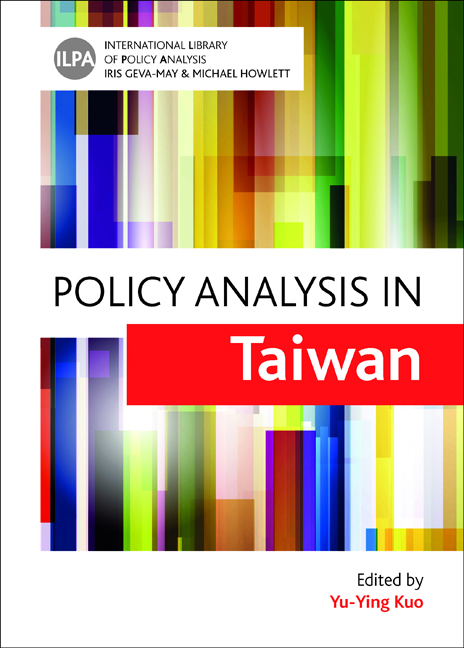Book contents
- Frontmatter
- Contents
- List of tables and figures
- Acknowledgements
- Notes on contributors
- One Policy analysis in a time of turbulence
- Two Exploring policy advisory committees in the central government
- Three Analysis of innovative local government policies in Taiwan
- Four Policy analysis in the legislative body: the legislative process of the Soil and Groundwater Pollution Remediation Act in Taiwan
- Five Policy analysis in the local councils
- Six Gendering policy analysis? The problems and pitfalls of participatory ‘gender impact assessment’
- Seven The power of influencing policies, or getting their share and more: interest groups in Taiwan
- Eight Think tanks in Taiwan
- Nine The development of public engagement in Taiwan
- Ten Social media and policy evolution in Taiwan
- Eleven Policy analysis by non-governmental organisations in Taiwan
- Twelve Policy network of universal healthcare reform in Taiwan
- Thirteen Public policy and administration research
- Fourteen Too critical to ignore? A tri-dimensional relationship examination of policy analysis internship in Taiwan
- Fifteen Policy analysis in Taiwan in an international perspective
- Sixteen Policy analysis education in Taiwan: a comparative perspective
- Index
Five - Policy analysis in the local councils
Published online by Cambridge University Press: 11 March 2022
- Frontmatter
- Contents
- List of tables and figures
- Acknowledgements
- Notes on contributors
- One Policy analysis in a time of turbulence
- Two Exploring policy advisory committees in the central government
- Three Analysis of innovative local government policies in Taiwan
- Four Policy analysis in the legislative body: the legislative process of the Soil and Groundwater Pollution Remediation Act in Taiwan
- Five Policy analysis in the local councils
- Six Gendering policy analysis? The problems and pitfalls of participatory ‘gender impact assessment’
- Seven The power of influencing policies, or getting their share and more: interest groups in Taiwan
- Eight Think tanks in Taiwan
- Nine The development of public engagement in Taiwan
- Ten Social media and policy evolution in Taiwan
- Eleven Policy analysis by non-governmental organisations in Taiwan
- Twelve Policy network of universal healthcare reform in Taiwan
- Thirteen Public policy and administration research
- Fourteen Too critical to ignore? A tri-dimensional relationship examination of policy analysis internship in Taiwan
- Fifteen Policy analysis in Taiwan in an international perspective
- Sixteen Policy analysis education in Taiwan: a comparative perspective
- Index
Summary
Introduction
Traditionally, the perception of local councillors in Taiwan is often associated with terms such as vote buying, influence peddling, bribery, corruption, incompetence, and lack of professionalism. They devote the majority of their time and resources to constituent services and securing funding for their electoral district's local projects. Accordingly, they play only a very limited role in non-budgetary policy decisions. After martial law was lifted in 1987, local governments were granted more authority and autonomous power to make decisions on providing local public services during the democratisation movement. However, the role played by local councils and their members in policy analysis remains limited.
Based on this line of reasoning, this chapter will first provide contextual information on the development of Taiwan's local government system, and a brief introduction on the duties and organisation of Taiwan's local councils. Then the roles played by Taiwan's local councils in local policy analysis will be analysed and the avenues through which policy-relevant information is provided to local councilmen will be explored and evaluated. Finally, the chapter will conclude by making recommendations on how policy analysis can be better conducted and utilised in local councils in Taiwan.
The purpose of this chapter is not to conduct a case study on a particular local council in Taiwan. Rather, the aim is to to outline as comprehensively as possible the roles of Taiwan's local councils in local policy analysis, and the avenues through which policy-relevant information is provided to local councillors. In order to provide such a overview of Taiwan's local councils, the existing literature on local politics and case studies on various local councils in Taiwan are synthesised to provide evidence to supporting the observations and arguments presented in this chapter.
Before we begin our discussion, it should be noted that special municipalities, county/provincial cities, and township-level governments are all granted local selfgoverning status in Taiwan based on the Local Government Act. However, townshiplevel councils will not be included in our discussion due to their limited role, if any, in local policy analysis. Therefore, in this chapter the term ‘local councils’ will only be used to refer special municipalities, and county/provincial city councils.
- Type
- Chapter
- Information
- Policy Analysis in Taiwan , pp. 67 - 80Publisher: Bristol University PressPrint publication year: 2015

